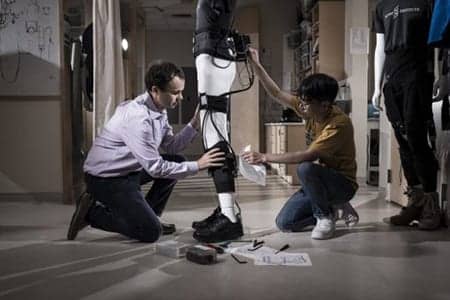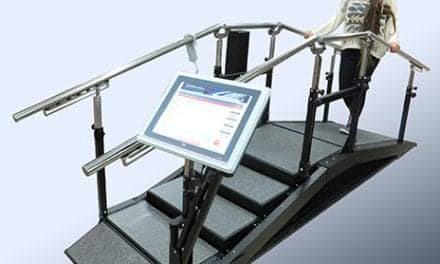
Conor Walsh and his graduate student, Jaehyun Bae, fine-tune an ankle-assisting exosuit. (Photo courtesy of Rolex Awards/Fred Merz)
A study published recently in Science Translational Medicine suggests that the use of a soft suit exoskeleton system helps aid in the facilitation of walking ability among ambulatory patients following a stroke.
Researchers from Harvard University’s Wyss Institute for Biologically Inspired Engineering, the Harvard John A. Paulson School of Engineering and Applied Sciences (SEAS), and Boston University’s (BU) College of Health & Rehabilitation Sciences: Sargent College developed the lightweight, soft, wearable ankle-assisting exosuit, and they they suggest in the study that it could help reinforce normal gait in people with hemiparesis after stroke.
The study centers on the use of the exosuit among nine participants, each of whom recently experienced a stroke, and examines the immediate improvements in walking capability that could be obtained when wearing the suit, dubbed the Restore system, according to a media release from ReWalk Robotics Ltd.
According to the release, the study concludes that improvements in paretic limb function contributed to a 20 +/- 4% reduction in forward propulsion interlimb asymmetry and a 10 +/- 3% reduction in the energy cost of walking, which is equivalent to a 32+/- 9% reduction in the metabolic burden associated with poststroke walking. Relatively low assistance (~12% of biological torques) delivered with a lightweight and nonrestrictive exosuit was sufficient to facilitate more normal walking in ambulatory individuals after stroke.
“This foundational study shows that soft wearable robots can have significant positive impact on gait functions in patients post-stroke, and it is the result of a translational-focused multidisciplinary team of engineers, designers, biomechanists, physical therapists, and most importantly patients who volunteered for this study and gave valuable feedback that guided our research,” says Wyss Core Faculty member Conor Walsh, who is also the John L. Loeb Associate Professor of Engineering and Applied Sciences at SEAS and the Founder of the Harvard Biodesign Lab, in the release.
ReWalk is working with the Wyss Institute on the development of lightweight designs to complete clinical studies, pursue regulatory approvals, and commercialize the systems on a global scale. The first commercial application will be for stroke survivors, followed by Multiple Sclerosis patients and then additional applications.
“Exoskeletons are now a commercially available, disruptive technology that have changed the lives of many individuals in the paraplegic community,” states ReWalk CEO Larry Jasinski, in the release. “The ongoing research at the Wyss Institute on soft exosuits adds a new dimension to exoskeletons that can potentially meet the needs of individuals that have had a stroke, as well as for those diagnosed with Multiple Sclerosis, Parkinson’s disease or people who have limitations in walking.”
[Source(s): ReWalk Robotics Ltd, PR Newswire, Science Daily]




